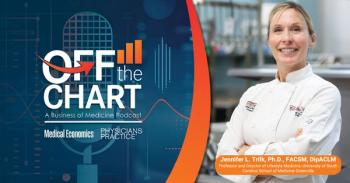
How PAs Help Identify and Manage Addiction
A physician assistant specializing in treating addiction shares some of the ways she spots drug seekers and addicts on the job.
As a Certified PA specializing in addiction, I have witnessed sick patients try to get well and fail time and time again. I have dealt with demanding, angry, and blatantly rude patients and heard all the excuses in the book. Yet I've come to love my job.
After six years working in medicine, I have learned that the addict is not the person they once were. They have lost themselves in the substance and the behaviors that feed the lifestyle. They have isolated themselves from anyone that really cares for them and their well-being. Following them in the initial phase of their recovery is a story of true determination. The shift in behavior and appearance of those who do recover is both incredible to witness and rewarding.
I see 100 to 150 patients a week, traveling among various residential and intensive outpatient programs in Orange County. By the time they are referred to our office, many are acutely ill, in active withdrawal, and have tried to get sober before.
While my job is in an addiction treatment setting, Certified PAs in non-psychiatric medical practices, like family medicine, see patients in the earlier stages of their substance dependence, when there is time to intervene and help change the trajectory of their life.
That's why I believe PAs with a specialty or interest in psychiatry can be an important partner for busy physician practices. Here are some ways Certified PAs can help identify and manage addiction.
•PAs, like physicians, are educated in the medical model, obtain medical histories, and assess general health. Because they are on the front lines of care, they can help define and document rules and policies about how your practice chooses to treat pain and general anxiety.
•PAs are known for the quality of their patient interaction. When obtaining the medical history, PAs can perform a pre-assessment for someone that may be at risk for addiction. Is there a family history of substance dependence, do they currently abuse drugs or alcohol, or do they have an underlying mental health issue?
For example, adolescents are in a high-risk category because of sports injuries or other general reckless behaviors. When they present with an injury, for which you may prescribe an opiate, they should be asked about social interactions, bullying, and family history.
Opiates can make you feel good. If a young person or adult for that matter, has poor coping skills, predisposition to addiction, and pain on top of it, you just introduced them to the best antidepressant on the market. They may continue to search for that feeling long after the prescription has run out.
•Communication skills are part of the PA curricula. PAs know how to have conversations with patients, parents, and caregivers. It is important to ask patients to put parents on consent forms if they are over 18. Make it a family affair to avoid secrets while keeping patients' trust.
•PAs can prescribe medications to help in relapse prevention. In my office, we use a lot of naltrexone or Vivitrol®, to help with alcohol and opiate cravings. However, if the patient is actively opiate dependent they will become physically ill if they abruptly stop. In these cases, patients should be medically detoxed to help avoid relapse due to extreme discomfort.
•Be on the lookout for med seekers, and refer to your plans and policies on how to deal with them. For example, a new patient may say he just moved from another state and needs a refill for Adderall®. It is recommended to re-evaluate that patient, have a copy of recent formal testing documents sent to your office, or call the pharmacy in their previous state to cross check their report. If you suspect addiction, you do not have to treat that patient with their preferred medication. If you have a patient whose anxiety is only allayed by Xanax®, you have another red flag. If a patient is filing the claim through insurance, the insurance company may call you if they notice a problem.
•PAs can supplement the practice's competencies in mental health. Behavioral health is part of the PA curriculum, and PAs can become more comfortable by completing CME in mental health. This is important for any provider because severe ADHD can look a lot like bipolar disorder, making it easy to prescribe a stimulant versus a mood stabilizer.
•PAs can build and use a list of therapists and referral resources, including a database of AA and NA meetings as well as other community resources.
There are difficult challenges facing physicians when it comes to addiction management. These range from a severe shortage of psychiatrists, to the desire to alleviate severe pain by prescribing a month's worth of opioids. However, increasingly providers recognize that opiates are not the answer for long term use. It can be a tough lesson. However, as caregivers we need to recognize that sometimes not prescribing may be the best way to do no harm.
Nelae Keene, PA-C, is employed by Orange County Psychiatry and Addiction Medicine in California. She has been certified by the National Commission on Certification of Physician Assistants for six years. She also has a Certificate of Added Qualifications in Psychiatry. She received her Master of Physician Assistant Science degree from Gannon University in Erie, Pa.
Newsletter
Optimize your practice with the Physicians Practice newsletter, offering management pearls, leadership tips, and business strategies tailored for practice administrators and physicians of any specialty.








